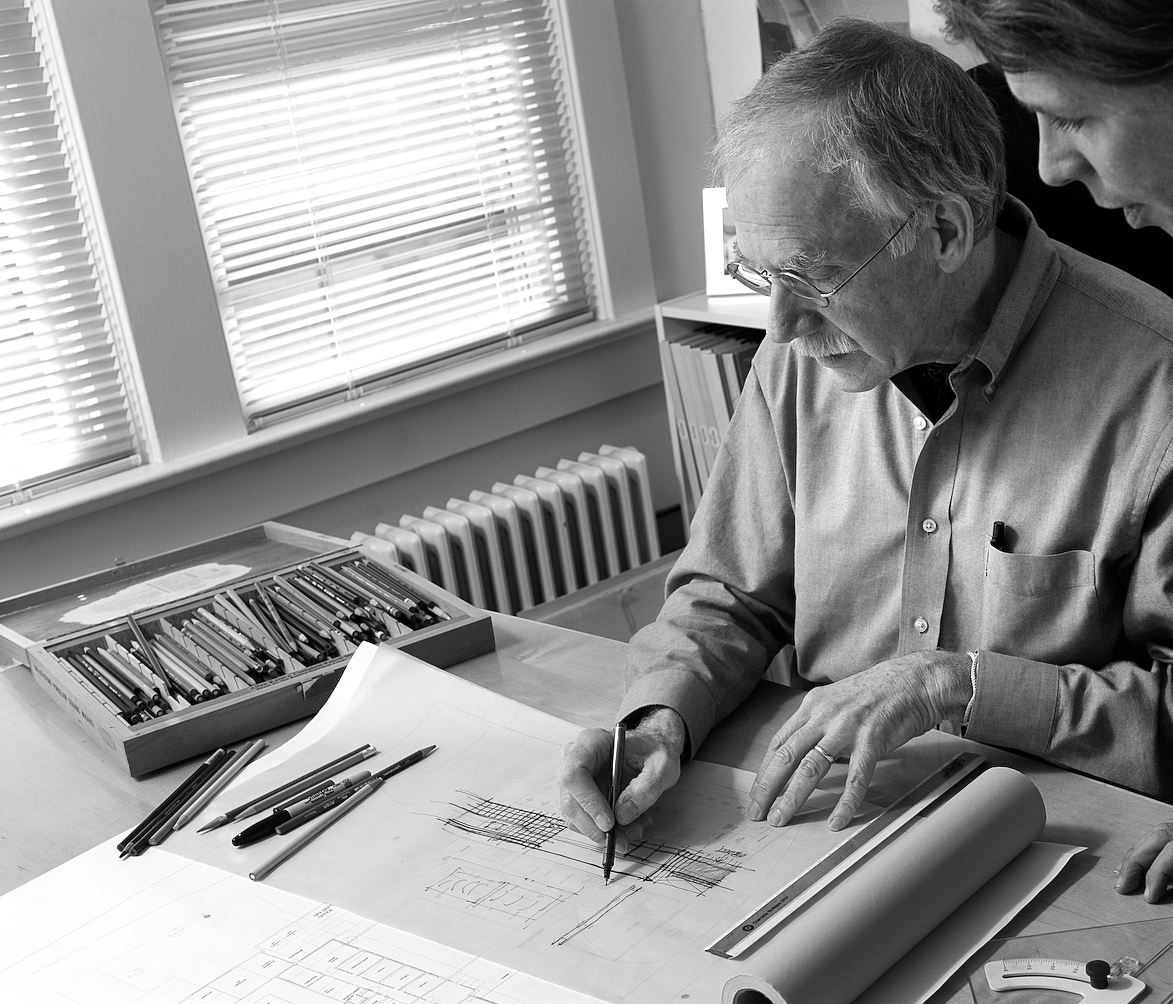KSS Architects co-founder Allan Kehrt, FAIA, LEED AP, PP will step down from his role as senior design partner to an emeritus position at the beginning of 2012 - a move that has been ongoing for more than 10 years as part of the firm's ownership transition plan.
Since establishing KSS Architects in 1983 with colleagues Michael Shatken and Rafael Sharon, Kehrt has helped the firm grow from a staff of three focused on residential design, into a 40-person company with offices in Princeton and Philadelphia. With the leadership of its six partners - Kehrt, Shatken, Edmund Klimek, Pamela Lucas Rew, David Zaiser, and Merilee Meacock - KSS has risen above recent economic challenges and developed an award-winning portfolio of projects across the nation in the markets of higher education, K-12 education, industrial, commercial, corporate interiors, municipal design and sustainable design.
"The past year was one of the strongest we have had in the market," Shatken said. "Allan shaped our core values about design excellence as well as client relationships, which all of the partners have instilled throughout the firm. As a result, our breadth of work and our national presence continue to grow."
"I will admit it's hard to back away from KSS after 28 years," added Kehrt. "But it's is something we have been planning for many years. I have absolute confidence that Michael and our next generation will continue to add to the exceptional achievements of KSS for many, many years. It's been a great ride!"
Kehrt's legacy of projects include Rutgers University's Biomedical Engineering Building, the renovation and expansion of Cornell University School of Hotel Administration, the recent new campus center at The Richard Stockton College of New Jersey and Princeton Township's Municipal Complex.
In 2001, Kehrt was elevated to the American Institute of Architects' College of Fellows, an honor bestowed to only 3 percent of all registered architects in the U.S. In 2008, Kehrt was nominated to the AIA's Jury of Fellows, a three-year post, and served as a chairman in 2010. Kehrt was also named Architect of the Year by AIA New Jersey in 2006.
Active in the design education community, Allan has served as faculty, guest lecturer, or juror at many colleges of architecture in the east, including the University of Pennsylvania, Philadelphia University, Moore College of Art & Design, New Jersey Institute of Technology and his alma mater Virginia Polytechnic Institute and State University, where he will continue on its Advisory Board. He has presented and lectured for many professional organizations including the American Institute of Architects and the Society of College and University Planning. BD+C
Related Stories
Museums | Aug 11, 2010
Design guidelines for museums, archives, and art storage facilities
This column diagnoses the three most common moisture challenges with museums, archives, and art storage facilities and provides design guidance on how to avoid them.
| Aug 11, 2010
Broadway-style theater headed to Kentucky
One of Kentucky's largest performing arts venues should open in 2011—that's when construction is expected to wrap up on Eastern Kentucky University's Business & Technology Center for Performing Arts. The 93,000-sf Broadway-caliber theater will seat 2,000 audience members and have a 60×24-foot stage proscenium and a fly loft.
| Aug 11, 2010
Citizenship building in Texas targets LEED Silver
The Department of Homeland Security's new U.S. Citizenship and Immigration Services facility in Irving, Texas, was designed by 4240 Architecture and developed by JDL Castle Corporation. The focal point of the two-story, 56,000-sf building is the double-height, glass-walled Ceremony Room where new citizens take the oath.
| Aug 11, 2010
Carpenters' union helping build its own headquarters
The New England Regional Council of Carpenters headquarters in Dorchester, Mass., is taking shape within a 1940s industrial building. The Building Team of ADD Inc., RDK Engineers, Suffolk Construction, and the carpenters' Joint Apprenticeship Training Committee, is giving the old facility a modern makeover by converting the existing two-story structure into a three-story, 75,000-sf, LEED-certif...
| Aug 11, 2010
Utah research facility reflects Native American architecture
A $130 million research facility is being built at University of Utah's Salt Lake City campus. The James L. Sorenson Molecular Biotechnology Building—a USTAR Innovation Center—is being designed by the Atlanta office of Lord Aeck & Sargent, in association with Salt-Lake City-based Architectural Nexus.
| Aug 11, 2010
San Bernardino health center doubles in size
Temecula, Calif.-based EDGE was awarded the contract for California State University San Bernardino's health center renovation and expansion. The two-phase, $4 million project was designed by RSK Associates, San Francisco, and includes an 11,000-sf, tilt-up concrete expansion—which doubles the size of the facility—and site and infrastructure work.
| Aug 11, 2010
Goettsch Partners wins design competition for Soochow Securities HQ in China
Chicago-based Goettsch Partners has been selected to design the Soochow Securities Headquarters, the new office and stock exchange building for Soochow Securities Co. Ltd. The 21-story, 441,300-sf project includes 344,400 sf of office space, an 86,100-sf stock exchange, classrooms, and underground parking.
| Aug 11, 2010
New hospital expands Idaho healthcare options
Ascension Group Architects, Arlington, Texas, is designing a $150 million replacement hospital for Portneuf Medical Center in Pocatello, Idaho. An existing facility will be renovated as part of the project. The new six-story, 320-000-sf complex will house 187 beds, along with an intensive care unit, a cardiovascular care unit, pediatrics, psychiatry, surgical suites, rehabilitation clinic, and ...
| Aug 11, 2010
Colonnade fixes setback problem in Brooklyn condo project
The New York firm Scarano Architects was brought in by the developers of Olive Park condominiums in the Williamsburg section of Brooklyn to bring the facility up to code after frame out was completed. The architects designed colonnades along the building's perimeter to create the 15-foot setback required by the New York City Planning Commission.








